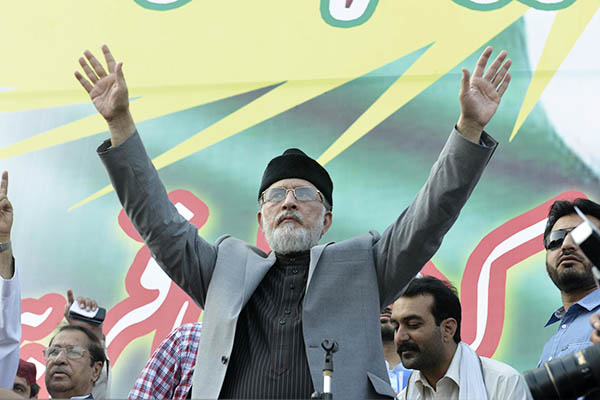
by Irfan Mahar 26 June 2022
Dharna politics has become a common phenomenon in Pakistan. Many political parties play the politics of dharna when they want the government to accept their demands. Through dharna politics, the political parties show sit-ins, block roads, commit violence, conduct protests, and stop the city’s social, political, economic and educational activities where they used to protest. Similarly, Khan’s Pakistan Tehrik-e-Insaaf (PTI) launched the True Freedom March (Haqeeqi Azadi March) on May 25, 2022. Khan called for protests all over the country against the collapse of his government. Moreover, he alleges the US involvement in dismissing the PTI government. Amid protests, clashes erupted in multiple cities. As a result, the long march reportedly claimed five lives and injured nearly two dozen people, including security officials. The protest was meant to be peaceful; however, it turned violent. Protesters set vehicles and trees on fire in the Blue Area of Islamabad. Therefore, the political situation in Pakistan has gone from bad to worse. Moreover, Khan repeatedly says that if the government does not accept his demand for new elections, he will again come to Islamabad to protest.
The former Prime Minister Imran Khan popularized Dharna politics in Pakistan. Back in 2014, Khan’s PTI and cleric Tahir-ul-Qadri’s Pakistan Awami Tehreek (PAT) organized sit-ins in Islamabad, which lasted for 126 days. According to the media report, the country bore Rs 547 billion losses to the economy and Rs 5 million worth of damages to public property. Furthermore, thousands of people who work on daily wages became deprived of earnings in the capital city. In addition, the Anti-government protest shattered the international image of the country. The President of Srilanka Mahindra Rajapaksa and Chinese President Xi Jinping cancelled their visits due to sit-ins in Islamabad. Likewise, 717 persons were injured, including 202 police personnel and three protesters lost their lives. Educational institutes remained shut resultantly; students lost valuable learning time. Furthermore, it affected the official works and activities within the capital city; resultantly, many crucial affairs suffered losses and delays. The capital city is considered the heart of any country; if it remains stuck, the affairs of the whole country also face problems.
Pakistan already has been suffering from multiple problems. Such as water issues, diseases like a lumpy virus, monkeypox, covid-19, cholera, financial issue, an increase in the value of the dollar, rupee decline, educational issues, polarization, identity crisis, corruption, ethnic and religious violence, the burden of foreign loans, instability, security issues, inflation and increase in fuel prices. Moreover, one of the most dangerous problems in Pakistan is polarization and lack of collective thinking. The country is divided into different interest groups; individuals, political parties, elite, bureaucrats, and multiple races, who only think of their interests over bypassing the interest of the country. Hence, this division leads them toward the lack of collective thinking necessary for the country’s development, peace, progress, and stability. The Pakistani nation has not generated a sense of collaborative thinking yet where every group prefers personal/self-interest over national interest. Until and unless the country’s people will not create a sense of collective thinking, irrespective of colour, caste, religion, ethnicity, community, and affiliation with any party or group, the country will lack unity; resultantly, it cannot become developed and stable.
Bypassing the interests of the country for self-interests has become a norm in the country. Most religious and political parties believe that the easiest and most effective way to make their demands accepted by the government is through sit-ins without pondering their impact on the country’s social, economic, and political affairs. Hence, everyone tries to achieve their interests through multiple strategies, planning and actions. In the war among these interest groups within the country, ultimately, ordinary people suffer a lot. No one is interested in the country’s unity, development, peace, and progress. This complex situation has left severe psychological impacts on people and destroyed the country’s image globally. Similarly, such groups and lobbies in most institutes, offices, and other places misuse their power and authority to suppress the people and make their demands accepted. One primary reason behind this is a lack of wisdom, vision, philosophical thinking, understanding, intellect, and knowledge. People have many expectations from the political leaders; they consider them the nation’s architects. However, unfortunately, most of the political leaders in Pakistan use Dharna politics as a tool to achieve their self-interest. In this regard, if they want to see the country’s development, peace, progress, and stability, all must think about the national interest and respect of the nation instead of their self-interest and personal gains.
The writer is a PhD Scholar at the Department of Defense and Strategic Studies, Quaid-i-Azam University Islamabad, Pakistan.



0 Comments
LEAVE A COMMENT
Your email address will not be published